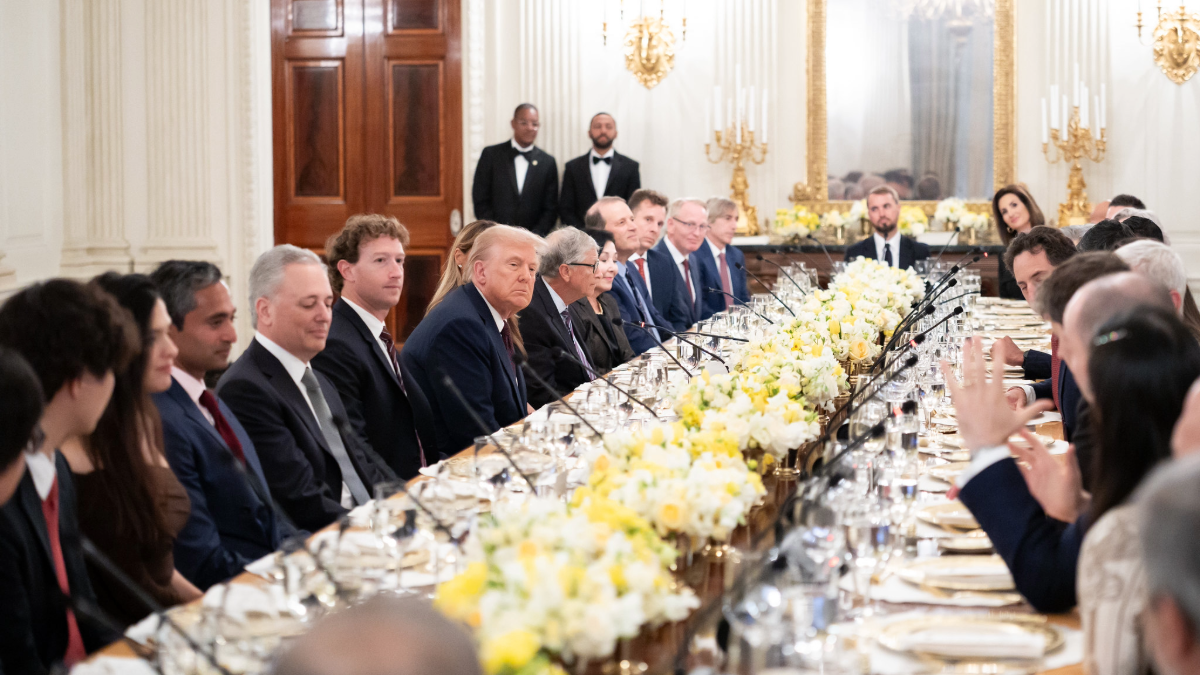The Dance with Big Tech is Different under Trump 2.0
Dave Karpf / Nov 13, 2025This perspective is part of a series of provocations published on Tech Policy Press in advance of a symposium at the University of Pittsburgh's Communication Technology Research Lab (CTRL) on threats to knowledge and US democracy.

President Donald Trump and First Lady Melania Trump host business and technology leaders for a dinner in State Dining Room at the White House, Thursday, September 4, 2025. (Official White House photo by Andrea Hanks)
I want to revisit an old provocation, from 2018.
2018 was the height of the techlash. The Cambridge Analytica scandal had created a window of opportunity. People were real mad at the tech platforms. Many of my peers were attempting to seize the moment, calling on the government to pass stricter social media regulations.
It seemed to me as though my colleagues were engaged in a bit of self-deception. And so I posed the question: “Which government? THIS government? Which member of the Trump golf and real estate empire would you like to see put in charge of regulating digital media platforms?”
The creative fiction at the heart of ‘regulate the monopolies’ arguments is that they pretend we are talking about a generic government. What’s missing today is not a failure of imagination or a failure of courage from public intellectuals or government officials. The US government is facing a crisis of competence. The Consumer Financial Protection Bureau, the State Department, the EPA, and every other agency is being hollowed out. Rebuilding our regulatory capacity is going to be a multi-year, potentially a multi-DECADE affair.
This is an uncomfortable reality. It feels unprincipled to recommend that the Obama administration should have regulated, and the alternate-universe Clinton administration should regulate, but then suggest a different course for life under the Trump administration. In an ideal world, we would be crafting a sensible framework that constrains the behavior of information monopolies.
I argued instead that, at least in the near term, our best bet was to motivate the self-interest of the tech platforms. A nervous monopoly is a well-behaved monopoly. We ought to apply pressure to Google, Facebook, Twitter, etc, and then do the best we could with the largesse of semi-benevolent/reputation-conscious monopolists. The time for regulation would come later, once the fever had passed.
I was, for a while, pleased with what transpired next. The years that immediately followed indeed turned out to be, as Kate Klonick wrote, the golden age of tech accountability. And then President Joe Biden brought in Lina Khan and Tim Wu and Jonathan Kanter and Gary Gensler. They were rebuilding state administrative capacity, addressing the crisis of competence. We had a real window of opportunity. As I liked to say, during those years, the best time to regulate Big Tech was in the 1990s and 2000s, and the second-best time was right now.
But the thing about windows of opportunity is that they can slam shut when the weather changes.
The second Trump administration has been worse than the first, and there is no longer any use in trying to appeal to the better angels of tech oligarchs’ nature.
It isn’t that my 2018 warning was incorrect, so much as it now strikes me as dismally incomplete. What I had not counted on was that the tech platforms would be much more responsive to the demands of a rising authoritarian than they would be from pressure from their workers, or their users, or their civil society peers. A nervous monopolist is a well-behaved monopolist, but we are not the ones making the monopolists nervous any longer.
This, I suspect, is the central explanation of Silicon Valley’s authoritarian turn: It’s a simple expected value equation. Imagine you are the head of a major tech company in the summer of 2024. The race is effectively a coin flip; there is a 50/50 chance that former President Donald Trump wins. In that scenario, he will vindictively pursue everyone who opposed him. That may be your company, or it may be your competitor’s companies. In that scenario, it is to your benefit to have been a staunch, public Trump supporter. On the other hand, if Vice President Kamala Harris is elected, then your company will face fines and antitrust suits. But you will also enjoy the benefits of living under the rule of law, which means she won’t single your company out just for having endorsed her opponent!
These are all multinational companies. They know how to do business in authoritarian countries. Faced with the prospect of the US tumbling into authoritarianism, they have each concluded it is their own best corporate interest to stay on the authoritarian leader’s good side.
I am here as the bearer of bad news, with no simple solution to offer. The tech platforms were never deeply wedded to the project of democracy. But they used to be moveable targets. They were significantly-resourced, half-hearted allies. Those who sought reform were able to persuade them to act in their own enlightened self-interest. Democratic stability is good for digital platforms. Civil society is good for digital platforms. A robust journalism industry is good for digital platforms. And so, if we partnered with them and pressured them, they would be of use in combatting misinformation and disinformation campaigns, and addressing the worst assaults on civil rights and civil liberties.
That is no longer the case. Platform companies are multi-vocal assemblages. The people who civil society groups and researchers partnered with in the past—the ‘allies’ within the firms – have been fired, quit, or been reassigned. They lost the internal arguments. This time, the companies will provide no check on authoritarian excess. Billions of dollars are flowing to Trump’s favored companies—and hundreds of millions have flowed from those companies to Trump’s inauguration, Presidential library, and White House ballroom. Platforms are eager to be part of this circular money-moving machine.
This moment will not last forever. The generative AI financial bubble will burst. The ongoing fraud and corruption will take a toll on everyone. Authoritarian governments are not known for their prosperity or their long-term stability.
But neither will it be brief. Stable, legitimate institutions are not hastily constructed or easily repaired. Those who advocate for change have fewer allies than last time, when we had some limited success in appealing to the better angels of big tech’s nature. Those angels are no more.
If we are going to repair democratic institutions, we are going to have to do it ourselves.
Authors
